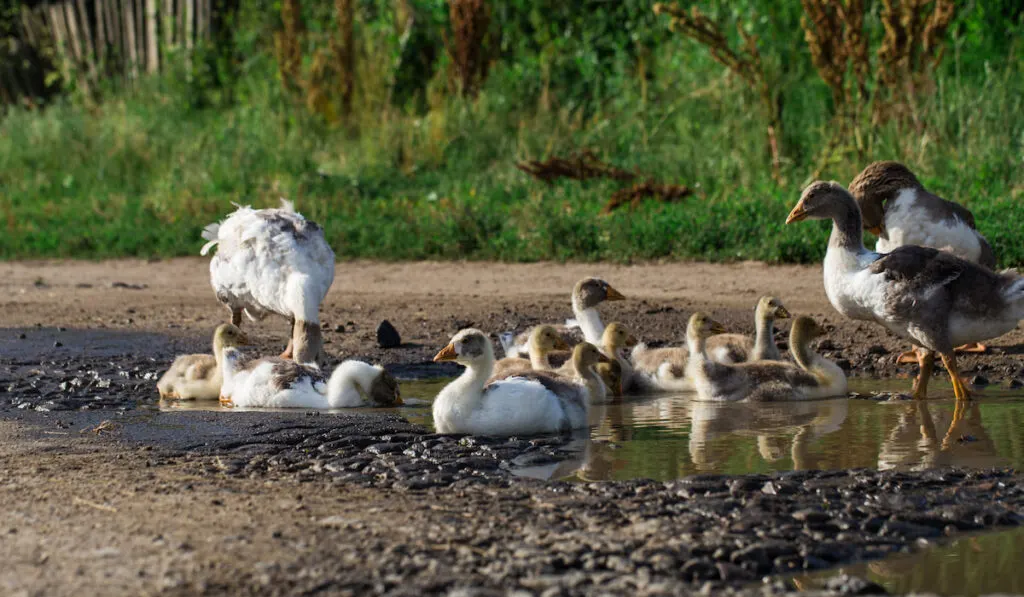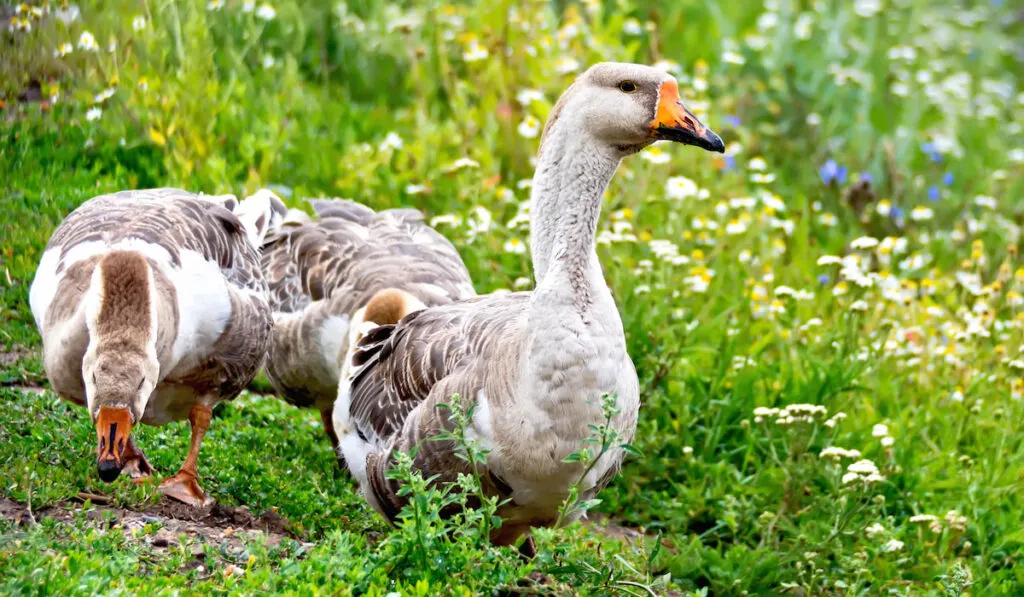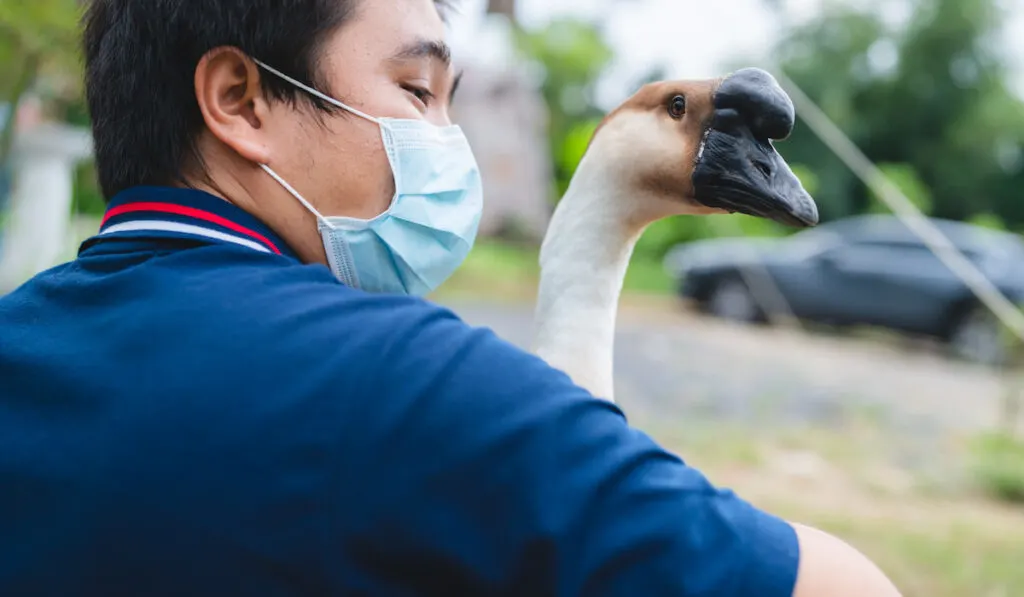If you are raising geese or are planning to, you should have contingency plans for when things go wrong. When raising geese, the most common challenge you can face is when your birds get sick. Many geese diseases affect their legs and their ability to walk.
Here are seven leg problems that your geese can have:
Table of Contents
1. Scaling Mites
The legs of your geese can become infected with mites. Mites are little parasitic arthropods that feed on the blood of their host (i.e. your geese). If your healthy-looking geese are unable to walk, it could be caused by a mite infection.
You should examine the legs of your geese for raised scales. If you can find red patches on the legs or even find some mites, you should clean the legs of your geese.
You should deep clean geese legs in alcohol and cover the entire leg with petroleum jelly. Petroleum jelly helps to suffocate any mite that is not killed by the alcohol. Do not pull the scales away. Instead, wait for new scales to grow.

2. Bumblefoot (Swollen Feet)
Swollen feet in birds are caused by a bacteria species called Staphylococcus. Geese can get this infection when they are injured on their foot. When your geese are injured, the Staphylococcus bacteria can infect the injury and make it swell.
Some ways to help your geese infected with Staphylococcus are:
- Antibiotic: Amoxicillin is the drug of choice for Staphylococcus.
- Isolation: You should keep your infected geese away from healthy ones. This will help prevent the transmission of Staphylococcus from the infected goose to others.
- Call the Vet: You should contact the vet for proper examination and treatment.
You should ensure that your geese have short clean grass to search for feed and there are no sharp objects that can harm your geese in the area.
3. Overgrown Nails, Cuts, and Bleeding
While getting overgrown nails is not a problem for free-range geese, it can be a challenge for geese in restricted pens as they do not walk often and their nails will continue to grow.
Overgrown nails can cause discomfort for your birds when walking, so you should check and trim their nails regularly.
You should also examine the legs of your birds for cuts and bleeding as they can prevent your geese from walking. Make sure to give your birds antibiotics if they are bleeding.
4. Fowl Cholera (Pasteurella)
Pasteurella is popular in waterfowl. It can cause your birds to become inactive. Some symptoms of Pasteurella are:
- Green droppings
- Lack of appetite
- Increased thirst
- No movement
- Death
You should call the vet if you notice these signs in your waterfowl.

5. Worms
It is very common for geese to get infected by parasitic worms such as nematodes Platyhelminthes, etc. When they are infected, some worms can restrict the movement of your geese and can even kill your geese.
You should worm your geese regularly using flubenvet or other vet-prescribed drugs.
6. Mycoplasma synoviae
This disease can cause some parts of the legs of your geese to become hot and swollen. When examining the leg of a goose, it will feel some pain if it is infected with Mycoplasma synoviae. You should call the vet immediately.
7. Niacin Deficiency
Ducks and geese require a high concentration of niacin in their diet. Niacin is a type of vitamin that helps to correct the development of young birds (chicks, ducklings, goslings, etc.).
If the feed of your geese does not contain enough niacin, you will notice the following:
- Slow or Stagnant Geese: Your birds will become reluctant to move.
- Swelling of the Hocks: The hock is a joint in the leg of your geese. If your geese have niacin deficiency, their hocks can swell.
- Bow Shaped Legs: A bow-shaped leg is a very clear indication that your geese are lacking niacin (or other nutrients).
If you leave your birds unattended to, a niacin deficiency can kill them. You should make sure that your geese are not lacking any vital vitamins.
Your geese need at least 55mg of niacin per kg of their feed. Most processed feed brands have enough niacin in the feed. For other food sources without niacin, you can buy niacin from a feed mill or drug store and mix it into the food of your geese.

Best Feeds for Geese to Prevent Nutrient Deficiency
Some diseases your geese can get infected with are caused by nutrient deficiency (especially vitamins to fight the bacteria). Here are some recommended feeds for geese:
1. Processed Feed
Aside from having a lot of proteins for your geese, processed feed contains a lot of vitamins and minerals. You should consider buying medicated feed as it will help prevent many diseases in the future.
2. Natural Feed
Allowing your geese to search for their food (during free-range) does not just save you some money, it also gives your geese a lot of probiotics. Probiotics are beneficial bacteria that can help fight harmful bacteria in your geese later.
3. Fruit and Vegetables
Fruits and vegetables are delicious sources of nutrients for geese. Do not give too many fruits to your geese as fruits contain a lot of sugars. Your geese can eat as many vegetables as they want.
You can also give seeds and grains to your geese as treats.
Related Questions and Answers
1. Do Geese Need Vaccines?

Every animal should get certain vaccinations. Vaccines protect your geese from potential diseases in the future.
There are different types of vaccines and your vet knows the best vaccine for your geese (based on your location and the age of your geese).
2. What Should You Do for Sick Geese?
Here are general care tips for sick geese:
- Isolate the Sick Goose: The first thing that you should do when a goose is sick is to isolate it from other geese.
- Call the Vet: When the goose is properly isolated, call the vet so that the vet can help examine your sick goose as well as recommend medicines for it.
- Examine Other Geese: Before returning your sick goose back to the others, you should make sure that it is fine. You should also examine others to make sure that none have become sick from the same disease.
More specific care tips for sick geese depend on what they are sick from.
3. How Do You Give Medicine to Sick Geese?
Giving medicine to birds can be a challenge. You should use the tips below:
- By Syringe Injection: A vet can administer injections to your geese. This method saves you the stress of treating your geese yourself.
- Giving Them Liquid Oral Drugs with a Feeding Bottle or Spoon: You can use a feeding bottle to give liquid oral drugs to your geese. Feeding bottles help prevent spills, but if you have no feeding bottle around, you can use a spoon.
- Mixing the Medicine in Their Feed or Water: If the medicine is in pill or powder form, you can mix it with their feed. For geese that have no appetite, you can dissolve the pill into water and give it to them using a water bottle or spoon.
Make sure that no medicines are wasted.
Final Thoughts
Geese can get sick from a lot of different things. Some potential leg problems for your geese are scaling mites, parasitic worms, deficiency of nutrients, cuts and bleeding in their legs, and more.
Protecting your geese from dangerous objects and feeding them nutrient-rich meals can help to prevent many kinds of potential illnesses and improve the life and health of your geese.
Resources
- http://www.fao.org/3/y4359e/y4359e0g.htm
- https://metzerfarms.blogspot.com/2011/03/are-my-ducklings-leg-problems
- https://poultrykeeper.com/external-problems/lameness-leg-problems/
- https://opensanctuary.org/article/common-goose-health-issues/
- https://www.backyardchickens.com/threads/gosling-cant-stand-up-edit-cure-for-goose-leg-problems-nutritional-yeast.826415/
